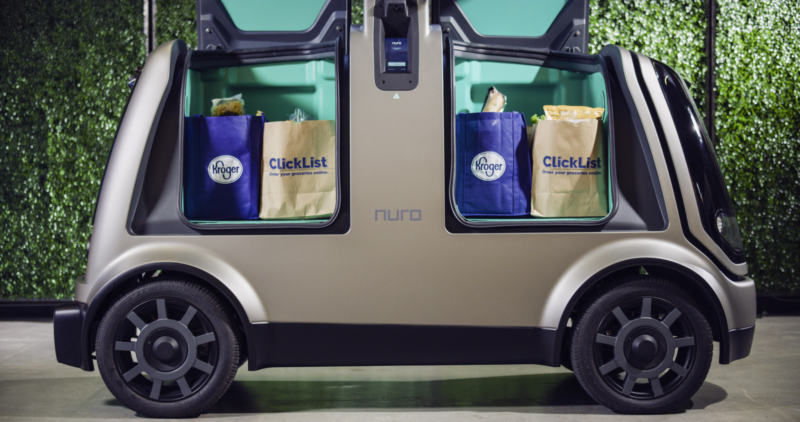June 28, 2018 at 08:16AM
via Ars Technica

Nuro
Most coverage of autonomous vehicles has focused on cars with human passengers in them. But there's also a big opportunity to use autonomous vehicles to transform the retail sector. And one promising company in that emerging industry is Nuro, a startup founded by two early members of the Google self-driving car team.
Now Nuro is announcing its first commercial partnership: with Kroger, one of the nation's leading grocery chains. Starting this fall, Kroger plans to start delivering groceries to customers using Nuro's autonomous vehicles.
Initially, the partnership will only be active in a single market—the companies haven't yet said which city that will be. But Nuro's goal is to eventually provide service across Kroger's entire retail footprint.
And that footprint is large. In addition to Kroger stores, the company also owns the Dillons, Harris Teeter, QFC, Ralphs, Roundy's, and Smiths supermarket chains, among others. In total, Kroger says it owns 2,800 stores in 35 states.
Nuro differs from some other autonomous delivery startups—including Starship and Marble—because its vehicles are designed to operate on public streets rather than on sidewalks. Its vehicles are designed to travel at speeds up to 25 mph (40 km/h)—fast enough to keep up with traffic in a lot of residential neighborhoods. Nuro hopes to increase its maximum speed to 35 mph (55 km/h) as its technology matures.
Why self-driving delivery vehicles are easier than self-driving taxis
A big reason Nuro has been able to get a commercial service to market quickly—possibly even launching before the founders' former employer Waymo—is that transporting goods is an easier problem than transporting people. Passenger vehicles not only need enough space for a human passenger but also for safety equipment like airbags. Nuro's vehicles don't need any of that, so they're small and light and will do much less damage than a full-size car if they run into something.
A taxi service needs to reach the destination quickly—which is why Waymo's vehicles are designed to travel at highway speeds. In contrast, a bag of groceries isn't in a hurry, so slower speeds aren't a problem.
Low speeds mean a much shorter stopping distance and much lower chance of serious injury if it were to hit a pedestrian or another vehicle. Shorter stopping distances also mean that low-speed vehicles don't need the expensive long-range lidar sensors required for highway driving.
"Our vehicle is half the width of a Toyota Corolla," Nuro co-founder Dave Ferguson told us in an interview last month. "If you think about it from a pure safety and flexibility standpoint, we have an extra 3-4 foot of safety buffer in terms of width that we can dynamically position around the vehicle." For example, suppose there is a row of parked cars on one side of a Nuro vehicle; it can then hug the opposite side of its lane, giving it more time to brake if a child darts out between two parked cars.
Ferguson told Ars that this could ultimately prove to be a huge market. Most people are used to driving their cars to stores to buy stuff, but it's likely to actually be more efficient—environmentally, economically, and in terms of customer time—to have stores send products out to customers on demand. In the long run, we could see retail stores gradually transform from destinations for human shoppers into warehouses for loading autonomous vehicles.